|
 The theme of Love Yourself Enough is intended to help
women focus on and invest in the health of themselves and their
family. Gift bags contained re-useable water bottles with the theme
listed on them and fliers about community health resources. There
were also door prizes given away during the evening’s events. The theme of Love Yourself Enough is intended to help
women focus on and invest in the health of themselves and their
family. Gift bags contained re-useable water bottles with the theme
listed on them and fliers about community health resources. There
were also door prizes given away during the evening’s events.

After a social hour with healthy and delicious fare, ALMH Foundation
Executive Director Sarah Helm welcomed everyone. She thanked the
Lincoln Knights of Columbus for providing the location, Heather
Cosby of Flossie and Delzena’s for providing the chicken salad, ALMH
dietary department for the other delicacies, ALMH’s Beth Simonson
for her hard work, and the ladies of the ALMH Auxiliary for being
the hostesses.

Helm said it is between 900-1000 donors who help generate $300,000
worth of revenue to provide programs like the Ladies’ Night Out and
make the ALMH Community Health Collaborative possible.

Jill Savage
ALMH Community Health Collaborative Director Angela
Stoltzenburg then introduced keynote speaker Jill Savage, an author
of several books and public speaker who founded the former
organization Hearts at Home. Savage lives “close to Normal or life
on the edge of Normal” and wants people to stop trying to be
perfect.
As Savage began, she said she was glad to be back in Lincoln where
she and her husband and children lived from 1987-1989 while her
husband Mark attended what was then known as Lincoln Christian
College. They moved from Indianapolis, Indiana with a two-year-old
and six-week-old and found it to be culture shock. For example, one
night they got a babysitter and went to Midnight Madness on the
square at 9:30 only to find all the shops closed. Savage said, “We
were not in Kansas anymore.”
Four Questions to ponder
Savage gave the attendees four emotional and physical health related
questions to think through and ponder.

Her first question, “What if I gave myself and other people the
FREEDOM to make mistakes.” Savage told a story of a time they were
supposed to meet friends at a wedding, but the friends never showed
up. It turned out their friends had gone to the wrong wedding and
did not realize it until they saw the bride.
Savage said if all mistakes were as innocent as her friends’ mistake
was, the question would not be a problem, but sometimes more is at
stake. Getting a call while making dinner from one of her children
she had forgotten to pick up at school one day is something Savage
beat herself up over. The child was sobbing when she got there, and
Savage realized she had messed up.

Many seem to have a guilt gene, and all have moments of guilt creep
in, but everyone makes mistakes. Savage said many may say, “I don’t
expect myself to be perfect,” but struggle over not being perfect.
This so-called “perfection infection” affects people emotionally and
physically as they compare themselves to others like the airbrushed
models that do not exist.
Savage said the perfection infection may come from the family we
grew up in. It may be coming home with five A’s and one B only to
have parents ask why the B is not an A. When made to feel anything
less than perfect is unacceptable we may “wear masks.’
When we expect perfection, Savage said we set ourselves up for
disappointment and disillusionment, but expecting mistakes can keep
us from disappointment.
The second question, “What if I had realistic expectations of myself
and others?”

Savage said one activity free Saturday, her one goal was to go on an
“archeological expedition” to find her kitchen counter. As she
worked, she was interrupted by various people such as one of her
sons, her husband and a good friend, all of whom were discouraged
and needed her to listen.
Savage said she had not uncovered the counter by that afternoon but
reminded everyone that real life is all about being available, plus
expecting to be interrupted and not getting frustrated by
interruptions. We should not lower expectations, rather we should
make them a little more realistic.
Marriages in crisis often suffer from unrealistic expectations. The
space in between unrealistic expectations and reality is often
discontentment, which affects us emotionally and physically,
increasing our anxiety. Savage said we need to expect our spouses
and kids to make mistakes and expect kids to fail at responsibility
and obedience. Research for a book she collaborated on showed Savage
the brain optimally grows through failure. When children learn to
walk and keep falling, we do not consider it failure, but when they
are older and “fall,” we consider it failure. Savage said we need to
remember their brain is growing.

We need to adjust expectations and look at our spouses and
interruptions differently. Even Kate Middleton did not look perfect
after having her third child, but many have unrealistic expectations
due to our culture. Savage said if we expect life to be imperfect,
messy and challenging, we will not feel like a failure.
The third question, “What if I took off my mask and was honest with
others?”

Savage said many of us hide behind masks of public relations
control, criticism and comparison. We compare our insides to
people’s outsides and come up with wrong conclusions.
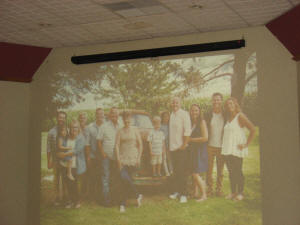
Savage showed a photo of her family, which includes
her and her spouse, their five children and spouses, and a few
grandchildren. She shared their realities include one daughter being
in marriage counseling, one daughter who was a colicky baby, one son
with serious ADHD who could not focus and did not turn in most of
his homework, one son who got divorced and then announced he was
gay, and one son adopted from Russia, who has mental illness and has
had many problems as a result.
The Savages have been married 35 years, but 25 happily due to
various challenges. Savage said her husband had a rough upbringing
and has struggled with depression, both of which contributed to
their marital dysfunction. Her husband had an affair and left for a
while but returned Easter Sunday. Now they help others with
marriages in crisis.
[to top of second column] |

Savage was diagnosed with triple negative breast cancer, which is
aggressive breast cancer negative for three usual fuels of cancer. She went
through surgery, chemotherapy and radiation. She had local photographer Michael
Gowin take photos of her when she had lost all her hair to remind her of what
she made it through. Savage is now considered cured, but reminded everyone to be
proactive about health and get mammograms to help with early detection.
We all struggle, but Savage said taking off our masks means we don’t have to
control our public relations or compare when we realize others struggle with the
same things. When we are at a store, we should remember people have backstories
we don’t know. Honesty begets honesty and when we remove masks, it deepens
relationships and friendships and creates a place for sharing.
The fourth and final question, “What if I replaced ‘being
perfect’ with ‘being perfected’?”
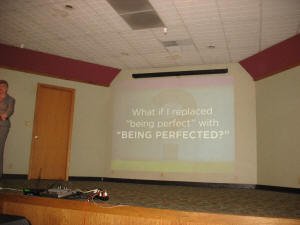
Savage’s oncologist told her to keep her weight healthy, exercise daily and eat
healthy, and she has become serious about pursuing health.
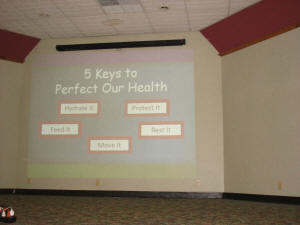
Savage said there are five keys to perfecting our health and our body:
1. Hydrate it. Water is like oil is to a car and dehydration can cause
headaches. Savage freezes oranges and puts them in her water so she is more
likely to drink it.
2. Feed it. Eat healthy foods, not ones out of a box. Eat fewer processed foods
and foods with less sugar. Savage said to read labels and if you cannot
pronounce ingredients, you probably should not eat it. She showed the dirty
dozen vegetable and fruits exposed to too much pesticide that are better bought
organic and the clean fifteen with fewer pesticides that are safer to eat. These
lists can be found at www.ewg.org

3. Move it. You do not need a gym membership. You can just walk to get in cardio
and do strength training build up our bodies.
4. Rest it. Rest helps regenerate our bodies during sleep. Savage said it is
like rebooting a computer.
5. Protect it. Savage said airplanes have more radiation that mammograms and
reminded everyone to have routine screenings to protect the bodies and catch
problems early.
Savage then reviewed the questions and said that following the above advice can
bring contentment, freedom and hope. Savage ended by saying we need to stop
comparing what we don’t have and caring for what we do.
Stoltzenburg discusses Community Health Collaborative goals and programs
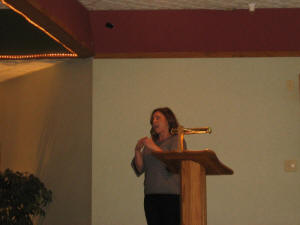
After delectable deserts, Stoltzenburg brought the evening’s events to a close
by speaking about the ALMH Community Health Collaborative.
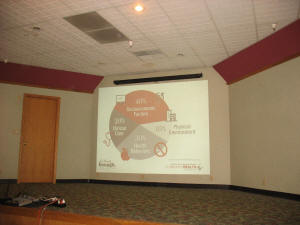
Stoltzenburg showed a graph focused on health factors around the county. Forty
percent of your health is determined by socioeconomic factors, 10 percent
determined by physical environment, 30 percent healthy behaviors and 20 percent
clinical care.
Logan County is ranked number 15 out of 102 counties in Illinois health care and
since January, the hospital has received three awards. One was Practice Green
for promoting sustainability, another for being in the top 100 for critical
access and one for being a Pathway designated hospital, which means it has
excellent nurses.
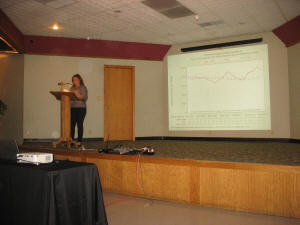
Stoltzenburg said potential life loss numbers, which notes those passing away
before age 75, are trending up. Since the county has clinical care under
control, she said there is a need to focus on the eighty percent that includes
socioeconomic factors, healthy behaviors and the physical environment, which is
where the Community Health Collaborative comes into play.

There is an advisory board funded by the ALMH Foundation that works on what we
can do as a community through leveraging resources and make an impact on local
health.
A recent Community Health Needs Assessment done in 2018 shows that for the next
three years, the county needs to focus on obesity issues, substance abuse
issues, and mental health issues.
Additionally, the collaborative is focusing on poverty and the hospital on
cancer. Stoltzenburg said a community health improvement plan has been created
to address the four priorities noted on the assessment.
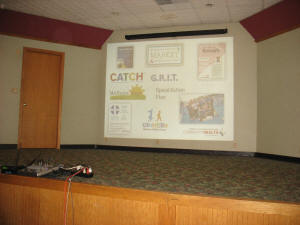
Stoltzenburg said the county has many programs to help address some of these
issues. There is bowling party every year to provide substance abuse awareness
and prevention, a fitness court on the old hospital site to encourage people to
exercise, and mental health first aid trainings to show people how to better
identify mental health crises and how to help.
There are also resources for recovery from addiction, a medication drop off at
the police department, and a new smart curve paddle to make mammograms more
comfortable. A 5K run/walk will be held soon to raise funds for programming and
a Moving with the Mayor event will be held May 22.

Programs for kids include Gaining Resilience in Teens (GRIT), a day long
workshop for all seventh graders in Logan County to empower youth by talking
about substance abuse prevention and other issues affecting their health; the
Mosaic project for behavioral health at schools to provide screenings and mental
health support, and the Coordinated Approach to Child Health (C.A.T.C.H.)
program. Stoltzenburg reminded everyone to eat more go foods than slow foods and
more slow foods than whoa foods.
The ALMH Market that began May 11th and will run through the end of September
will have vendors, provide health screenings and a few programs for kids.
Stoltzenburg said everything, including the Ladies’ Night Out, is made possible
due to partnership with the city of Lincoln, Logan County Department of Public
Health, schools and other agencies. She closed by thanking everyone for coming
and the ALMH Ladies’ Auxiliary for hosting.
[Angela Reiners] |